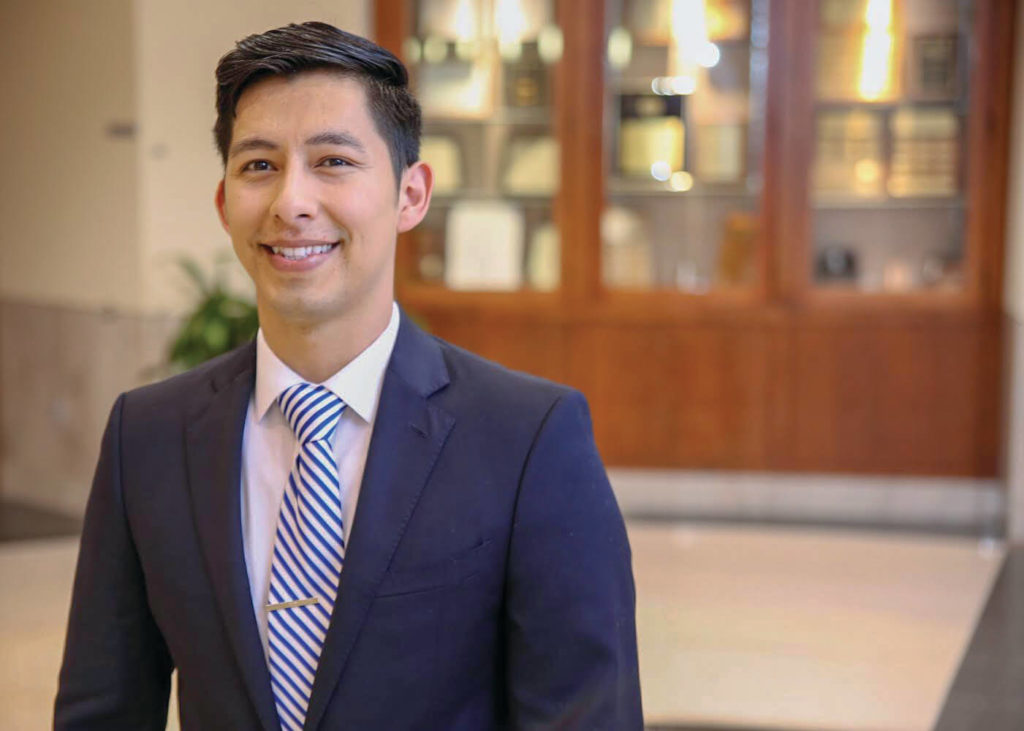There was no other career choice for Juan Quevedo (’16).
As a teenager in Southern California, he witnessed the challenges of low-income families who faced deportation and other challenges related to immigration.
That experience stirred in him a desire to defend those who could not defend themselves and led him to the Bronx Defenders’ Immigration Practice in Bronx, N.Y.
Describe the work you do and what a day on the job might involve.
I provide free legal representation to low-income immigrants facing deportation in the City of New York, as well as detained New Yorkers facing deportation in the nearby immigration courts in New Jersey. I handle all aspects of deportation proceedings, including bond hearings, applications for cancellation of removal, asylum and related relief, adjustment of status and hardship waivers, applications to the United States Citizenship and Immigration Services, appeals to the Board of Immigration Appeals, and support for habeas petitions to federal district court. In addition, I research and write motions, develop case theories, write briefs, prepare clients to testify, and conduct direct examination of clients and expert witnesses.
Why have you made advocacy such an important part of your legal career?
I grew up in Southern California and went to a university for undergraduate school where 80 percent of the students we Latin American. I witnessed struggles certain people were having due to their immigration status, and that always stuck with me. Under current law, low-income people in immigration detention do not have a right to an attorney if they can’t afford one. I believe, however, that every person in immigration detention deserves representation regardless of income, criminal history, or relief eligibility.
What are some of the frustrations that come with this work?
Sometimes, there’s nothing we can do. The law is what it is. It provides that only certain forms of relief for people who meet certain criteria. So there are a limited number of things that we can do for people to help them. It is heartbreaking for me to meet clients that are otherwise great people, but there is no way to help them. Our immigration laws operate exactly the way they are written and that means we can provide relief for some people and not supply relief for others. And that’s just the way it is.
What are some of the rewards that come with this work?
It is gratifying for me to help people who are vulnerable understand what their rights are within immigration and outside of it. I represent a lot of fathers, mothers, sons, and daughters. Being able to keep the family together is one of the most satisfying things about this job. In addition, advocating for release on bond reduces that amount of time my clients spend in immigration custody, I help lower the social and economic costs of homelessness, foster care, and unemployment created by immigration detentions and avoidable removals.
If you could talk to law students who are considering a similar career path, what would you tell them about your work in advocacy and what advice would you give them?
Dedication to public interest, with specific emphasis on immigrant rights, is one of the many things future employers that work in immigrant advocacy will look for, so start seeking advocacy roles now. Participate in clinical courses, moot court competitions, and alternative spring break that involve non-citizens. Providing direct representation of non-citizens in immigration court is not necessary.
The intersection of our immigration laws with other area of laws is complex and convoluted. For example, a low-level arrest or conviction or special finding in family court can have devastating consequences on a non-citizen’s ability to remain in the United States with their families. Therefore, consider supporting non-citizen clients through criminal, family or civil proceedings.
Finally, consider opportunities to obtain or improve a non-citizen’s immigration status. Consider checking for eligibility for affirmative benefits, including citizenship, adjustment of status and green card renewals, employment authorization, special immigrant juvenile status, or U- and T-visas.
This is the sixth in a series of interviews originally published in the May 2019 issue of Tennessee Law.
